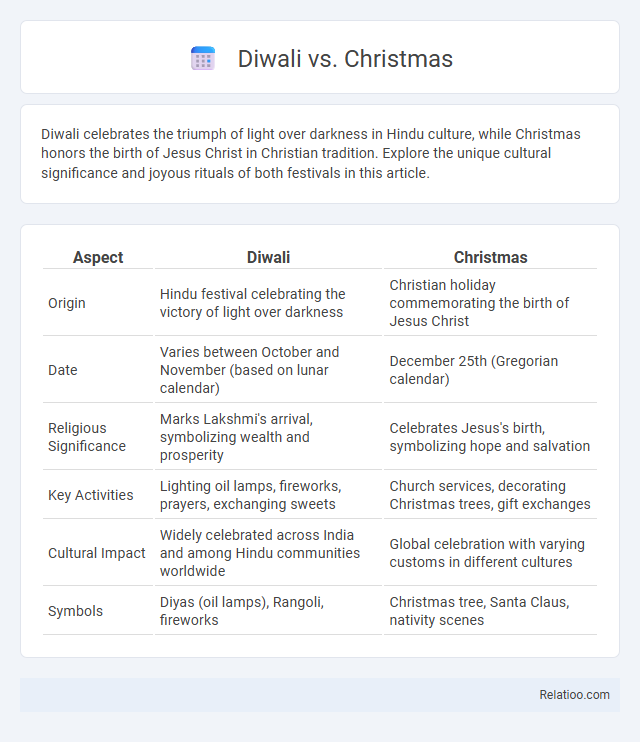Diwali celebrates the triumph of light over darkness in Hindu culture, while Christmas honors the birth of Jesus Christ in Christian tradition. Explore the unique cultural significance and joyous rituals of both festivals in this article.
Table of Comparison
| Aspect | Diwali | Christmas |
|---|---|---|
| Origin | Hindu festival celebrating the victory of light over darkness | Christian holiday commemorating the birth of Jesus Christ |
| Date | Varies between October and November (based on lunar calendar) | December 25th (Gregorian calendar) |
| Religious Significance | Marks Lakshmi's arrival, symbolizing wealth and prosperity | Celebrates Jesus's birth, symbolizing hope and salvation |
| Key Activities | Lighting oil lamps, fireworks, prayers, exchanging sweets | Church services, decorating Christmas trees, gift exchanges |
| Cultural Impact | Widely celebrated across India and among Hindu communities worldwide | Global celebration with varying customs in different cultures |
| Symbols | Diyas (oil lamps), Rangoli, fireworks | Christmas tree, Santa Claus, nativity scenes |
Introduction to Diwali and Christmas
Diwali, known as the Festival of Lights, celebrates the victory of light over darkness and good over evil, primarily observed by Hindus, Sikhs, and Jains over five days with vibrant decorations and fireworks. Christmas marks the birth of Jesus Christ and is widely celebrated by Christians around the world through traditions such as decorating Christmas trees, exchanging gifts, and festive meals. Your understanding of these holiday traditions highlights the rich cultural significance and diverse customs that bring people together during the festive season.
Historical Origins and Significance
Diwali, rooted in ancient Hindu mythology, commemorates the victory of light over darkness and good over evil, symbolized by Lord Rama's return to Ayodhya after defeating Ravana. Christmas originates from Christian traditions celebrating the birth of Jesus Christ, intertwining religious reverence with cultural customs that date back to the 4th century AD. Holiday traditions around these festivals emphasize family gatherings, feasts, and light displays, reflecting deep historical and spiritual significance tied to renewal, hope, and community bonding.
Key Religious Beliefs
Diwali, Christmas, and holiday traditions stem from distinct religious beliefs: Diwali celebrates the victory of light over darkness in Hinduism, honoring deities like Lakshmi and Rama; Christmas marks the birth of Jesus Christ, central to Christian faith and the message of salvation; while holiday traditions often include diverse customs rooted in cultural and spiritual practices worldwide. Your understanding of these key religious beliefs enhances appreciation for the unique symbolism and rituals each celebration embodies. Recognizing their spiritual significance fosters respect for diverse expressions of faith during festive seasons.
Traditions and Rituals
Diwali traditions center around lighting oil lamps, performing pujas to Goddess Lakshmi, and sharing sweets to symbolize the victory of light over darkness. Christmas rituals include decorating Christmas trees, attending church services, and exchanging gifts to commemorate the birth of Jesus Christ. Holiday traditions vary globally, often combining festive meals, family gatherings, and cultural ceremonies that reflect local heritage and seasonal celebrations.
Festive Decorations and Symbols
Diwali decorations feature vibrant diyas, rangoli patterns, and marigold garlands that symbolize light overcoming darkness and prosperity. Christmas is characterized by evergreen trees adorned with ornaments, twinkling lights, and nativity scenes representing the birth of Jesus Christ. Holiday traditions across cultures often include symbolic decorations such as candles, wreaths, and festive colors that convey themes of joy, hope, and renewal.
Food and Culinary Delights
Diwali features an array of sweet treats like ladoos, barfis, and jalebis, along with savory snacks such as samosas and pakoras, emphasizing rich, spiced flavors symbolic of celebration. Christmas culinary traditions highlight roasted meats, gingerbread cookies, fruitcakes, and eggnog, reflecting warmth and festivity in Western cultures. Holiday food customs across cultures combine unique ingredients and festive recipes that bring families together, showcasing the diversity of global culinary heritage.
Family Gatherings and Social Celebrations
Diwali, Christmas, and holiday traditions each emphasize family gatherings and social celebrations as central components, with Diwali highlighting vibrant home decorations and festive feasts shared among extended family. Christmas is characterized by exchanging gifts, decorating trees, and communal worship, creating a warm atmosphere for your loved ones. Holiday traditions across cultures involve uniting families and communities through rituals, meals, and joyous activities that strengthen social bonds.
Gift-Giving Customs
Diwali gift-giving customs emphasize sweets, dry fruits, and symbolic items like diyas that represent prosperity and goodwill. Christmas gifting involves exchanging wrapped presents such as toys, clothing, and gadgets, reflecting generosity and festive cheer. Your holiday tradition may incorporate elements from both, blending cultural values that celebrate giving as a way to strengthen relationships and share joy.
Global Influence and Cultural Impact
Diwali, Christmas, and various holiday traditions each hold significant global influence and cultural impact, shaping celebrations across continents. Diwali, known as the Festival of Lights, symbolizes the victory of light over darkness and is widely celebrated in India and among the Indian diaspora, promoting cultural unity and spiritual renewal. Your understanding of these traditions highlights their roles in fostering global interconnectedness and preserving diverse cultural identities through rituals and festive gatherings.
Conclusion: Celebrating Diversity and Unity
Diwali, Christmas, and other holiday traditions each showcase unique cultural rituals, symbols, and values that enrich global celebrations. Embracing these festivities fosters your appreciation for diversity while highlighting the shared human desire for joy, hope, and togetherness. Celebrating different holidays promotes unity by encouraging respect and understanding across various cultures and communities.

Infographic: Diwali vs Christmas
 relatioo.com
relatioo.com